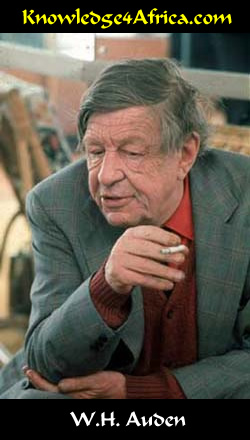|
READ THIS
"Unknown Citizen" satirizes the modern day delight for using statistics, something now common
in every part of life.
The state takes a census every five years and then draws up tables to show what the average person
does, buys, how many children he/she has, what religion he/she belongs to, etc.
Social psychologists ask people questions and draw up statistics of the way in which people think.
Agencies working on behalf of producers interview people to draw up tables of what the average person
buys, wants, etc.
The poet asks the question: If someone could be found who fitted perfectly into the statistical average,
would not his or her life be dreadfully boring?
On the other hand, there is also the belief that modern society is becoming depersonalized. The state
knows nothing about its citizens as people.
 A NOTE ON THE POET
A NOTE ON THE POET
Wystan Hugh Auden is regarded by many as the most influential poet of the 20th century, a man who
inspired other giants of the poetic world such as Cecil Day-Lewis, Louis MacNeice and Stephen Spender.
He was born in 1907 in York, the son of a medical practitioner and a university-educated mother. He
attended Oxford University where he graduated in 1928 with a lowly 3rd class degree in Literature.
While at Oxford, he became known for his poetry and his eccentricities and, most notably, for his series
of homosexual relationships.
Auden became a schoolmaster, which later allowed T.S. Eliot to criticise him for allowing his pedantic
teaching style to influence his poetry.
In 1935 he married Erika Mann, a German lesbian who needed to escape from Germany. The marriage
was one of convenience, designed purely to provide her with British citizenship.
During the 1930s Auden became captivated with left-wing politics and social causes, although he would
later tire of the contradictions inherent in this. Eventually he would claim that politics and art could never
be combined.
In January 1939, shortly before the outbreak of war, he sailed for New York. Because this was seen as
desertion from his homeland which was about to be embroiled in conflict, he lost much of his reputation
in England. As a result, he settled in the United States and eventually took out citizenship there.
While living in America, he established a permanent relationship with the 18 year old poet, Chester
Kallman, who would become his lifelong companion.
Auden would lecture literature at several universities, including Oxford where his tenure demanded that
he give only three lectures per year.
He would die in Vienna in 1973, shortly after delivering a guest lecture.
Have you looked at the questions
in the right column?
|
TEST YOURSELF!
Read the left column and then answer
the following questions:
Comment on the title of the poem, and on the subtitle. (4)

[Need help?]
Consider the following:
- Several modern countries have monuments to "the unknown soldier" or the "universal
soldier";
- Auden takes a satirical look at "the unknown citizen", the universal citizen who is known only
by his statistical information;
- Even the inscription on the monument is a statistical number.
|
What, in your opinion, is the overall TONE of this poem? Explain why you come to that
conclusion? (4)

[Need help?]
Ask most children what they think of this poem, they will answer "boring!" And that is the FEELING
of this poem. Is not the poet saying to us, "Mr Average Citizen is a thoroughly boring person, a
spineless individual!" The poem therefore has a satirical TONE, that statistical information actually
points to a very boring society.
|
The poet asks, "Was he free? Was he happy?"
- Would the answer to these questions be "Yes" or "No"? Explain why you think
this. (4)

[Need help?]
There are actually TWO answers here, aren't there? The poet presents his question in a rhetorical way
and tells us, "Of course Mr Average is happy because, if he isn't, then the State itself must be a
thoroughly unhappy place."
On the other hand, the poet does seem to be saying that it is thoroughly boring to be average. There is
a hint of the biblical comment, "Be either hot or cold, or I will vomit you out of my mouth!" In short,
be anything but average. And certainly don't be spineless!
|
If "frigidaire" is the name of a refrigerator, why is it not spelt with a capital letter? (4)

[Need help?]
"Frigidaire" as a name of the manufacturer should indeed begin with a capital letter. However, the
term "frigidaire" has come to represent all refrigerators and is therefore used here as a common
noun. In the same way, people often speak of hoovering their carpets because Hoover was the name of
the first vacuum cleaner.
|
This poem is a social satire. Be able to explain why this is so. (4)

[Need help?]
Social satire means making gentle fun of society. In what way, therefore, is the poet making fun of
modern society and its fetish for statistics?
The truth is that statistics have a major impact on buying habits of people. Few people think for
themselves but rather do what everyone is doing. So, when statistics point out that "everyone" is
doing this, we rush out to do the same thing!
It is very difficult to stand up for oneself, or stand out against society. Indeed, modern people tend to try
to pull down the "tall poppy", tend to insist that all people must be equal and that no-one must be
more equal than others.
|
Can you think of any logical reason for the poet using the very strange rhyming scheme found in this
poem? (4)

[Need help?]
Here is just one suggestion: is the poet deliberately setting himself free from any common form of
rhyming scheme, deliberately avoiding the average rhyme. It is indeed a very complicated rhyming
scheme. See if you can write it down.
|
|



